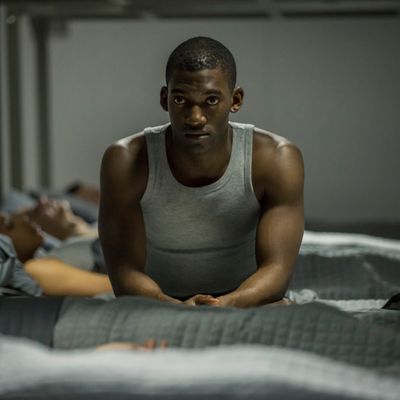
If pop culture is to be believed (and if it’s not, then good lord, what do we even have left?), wars are not won on the battlefield or in the Situation Room. They’re won in the hearts and minds of soldiers on the ground, most often through extraordinary bravery and valor in times of great crisis. The good guys triumph over bad guys in war narratives because they’re purer right down to their very souls, fighting for freedom and righteousness over no-goodniks who’d like to alienate those inalienable rights. The emphasis here is on alien, or so it appears in “Men Against Fire,” a military-minded installment of Black Mirror that pits human soldiers against yowling, vampiric-looking mutant monstrosities in a vaguely defined conflict that isn’t what it seems.
“Men Against Fire” similarly hones in on the psychological component of organized warfare, but not to show off how courageous our boys and girls in uniform can be. Writer Charlie Brooker and director Jakob Verbruggen instead posit hate as the deciding factor during wartime. For soldiers to evolve into full-fledged warriors, sincere contempt for the enemy must course through their veins. It is not enough to enter the fray out of a sense of duty to one’s country; a bona fide, bloodlusty desire to go forth and exterminate gets fingers squeezing triggers. It’s an ugly sentiment, but war’s an ugly business.
The futuristic conflict that plays out in “Men Against Fire” seems to be a right and just war. Sharp-toothed, feral Nosferatu look-alikes pejoratively called “roaches” have infested Britain to steal everything they can get their grubby little hands on, attacking anyone unfortunate enough to cross them. Something must be done, and so the job falls to skittish troop Stripe (Malachi Kirby) and his squadron. Their mission is simple: to storm a stronghold taken over by the roaches and clear the area as best they can. Everyone talks a big game about how many enemy combatants they plan to blow away, but after Stripe walks into a sneak attack and has to knife one of them to death at close range, he’s rattled.
The behavior of these roaches looks strange and inconsistent to Stripe. In one moment, they’re scuttling around and gnashing their fangs like animals; in the next, they’re operating sniper weaponry. Along with his worsening case of PTSD, Stripe’s got an unshakable feeling that the roaches are up to something, his bosses know what it might be, and nobody’s telling anyone anything. His suspicions only grow after he picks up a foreign doohickey, which then spontaneously activates in his hand, a move we in the business call “pulling a District 9.”
The much easier point of reference for “Men Against Fire” is Paul Verhoeven’s sci-fi satire Starship Troopers, another thinly veiled commentary on the culture of virulence that warring nations have to cultivate. And in comparing the two, we get a sharper image of where Brooker and Verbruggen’s episode goes awry. There’s little subtlety to be found in either work, but the accusatory tone of Verhoeven’s critique of American exceptionalism makes its in-your-face quality more arresting than obvious. Leaving no room for misinterpretation doesn’t look so good on “Men Against Fire,” which leans on a twist visible from miles away and then abandons its loftier satirical aspirations shortly after deploying it. It easily marks the low point of this third season.
Outside of some harrowing visual representations of the mental ruin that violence can wreak on soldiers — a cleanly composed shot of a sleepless Stripe sitting upright in bed as his comrades’ fingers twitch mid-slumber will stick with you — “Men Against Fire” doesn’t offer anything new. War is hell, that’s not breaking news, but even the deeper insight that the presumed “we” may not be the good guys barely registers as fresh. Verbruggen and Brooker make this fairly rudimentary point early on and then spend the rest of the episode turning Stripe’s internal anguish from “difficult” to “excruciating” once they run out of ideas. What plays out between him and his government handlers is brutal, but it’s also inevitable to the point of getting tiresome. Attentive viewers end up anticipating the episode’s emotional climax about two minutes ahead of time, and once that thrill is gone, all we can do is stare numbly at the violence.
“Men Against Fire” is also the most gratuitously violent episode of the new Black Mirror batch, probably by design. Even if Brooker and Verbruggen intend to confront us with the most shocking realities of war, though, their efforts are rather entry-level. When it comes to this show, going broad only weakens the allegory at the heart of an episode’s concept, and “Men Against Fire” takes easy targets into its crosshair.
None of this criticism should detract from Kirby’s trembling, vulnerable performance, which gives an otherwise simplistic metaphor a grounded component worthy of the audience’s emotional investment. Regarded as a whole, however, “Men Against Fire” feels thin and punishingly grim. It doesn’t add up — this should be more relevant than ever, with American voters braying for the blood of our nation’s enemies in record numbers at rallies that disguise mercilessness as patriotism. As incisive war commentary goes, this episode is less state-of-the-art than the high standard Black Mirror sets for itself, not to mention missing the delectable gallows humor that Brooker made his trademark.
War turns children into broken adults, and the most interesting notion that “Men Against Fire” puts forth is that this traumatic process can take place on a culture-wide scale. Sadly, this happens to be one of those Black Mirror installments that works better in theory than in practice. It boasts some neat ideas, but it’s too heavy-handed in its execution to realize their full potential. In simple terms, it plays out like the raid on the roach stronghold: Despite carefully laid plans, everything falls to pieces when put into action.

